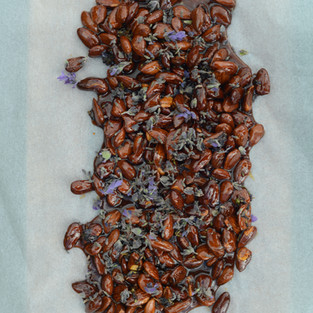ALEESHIA TOZZI - ANNA TASCA LANZA
- SSAW Collective
- Nov 6, 2020
- 6 min read
Updated: Nov 27, 2020
Not long ago, my two chef colleagues, Anna and Mattia and I (full disclosure: Mattia is also my fiancé) were in the car on a windy country road from Modica to Noto listening to Radio Deejay, Italy’s ‘pop hits’ station. An evening call-in program was on and Italians from across the country were sharing various stories about the little things in life. It was a beautiful drive through a landscape that is vastly different from the sheep-dotted, wheat-field hills that surround us at Anna Tasca Lanza cooking school in what is known as the entroterra of Sicily. Here, in the southeast triangle that juts into the Ionian Sea, large limestone plateaus give way to meandering canyons and unfettered views of sapphire seas.
The three of us were out exploring on a week-long journey to clear our minds and recharge our senses with a cambia d’aria (a change of air). Suffice it to say, the school has been struggling since the onset of the global pandemic and our small team was facing some major burnout after six months of the eerie mix of constant uncertainty but intense monotony that, I believe, is gripping everyone right now. This week was a welcome break from our various lessons, all being taught online at the moment, tentatively planning for the future and generally stressing about how to make ends at the school meet through the next month.

But back to the radio program. One of the stories shared was about honey, specifically about a new trend that is sweeping the nation (which I should clarify, really means wealthy northern regions like Milan and Turin) for raw honey due to it having a higher presence of nutrients.
However, the radio deejays were a little stumped on what actually constitutes raw honey, lurching from how honey isn’t vegan, to saying if you are going to eat raw honey make sure that it is organic because there could be a higher presence of bacteria without pasteurization, to puzzling over if the comb was edible. These incoherent ramblings, a clear sign of information pulled from hastily typed press releases and feeble Google searching, at first gave the three of us a chuckle.
All being Masters graduates of the University of Gastronomic Sciences, honey, pasteurization and artisanal production were topics that we had studied and understood well. We wondered out loud how honey could be such a confusing topic, but with further listening, I started to feel frustrated with the poor knowledge these three disc jockeys were doling out to the nation, that the gap between farm and plate is so wide that three bumbling radio personalities could buzz about with such good intentions and still be sharing such bad advice.

It is a common feeling for me, creeping in when people call my care about the provenance of food snobby or when I read regurgitated nutrition advice that is still only pushing processed and convenient food without any link to how or who made it.
My frustration gave way to another thought: this is why our work at Anna Tasca Lanza is so important. Edible education is at the foundation of every program, experience and stay we offer. Thirty years of research on Sicilian food heritage provide a sturdy platform from which we are able to help people connect with where their food actually comes from.
In the nebulous fog of shifting realities and quick pivoting that has surrounded us for most of this year, this single thought brought me back to why I am in Sicily and why I continue to choose the path of good food, however meandering it can be.


Let us get back to the bees as an example.
It would be a bold lie to claim that Sicilians don’t eat low-quality food that is exported from around the world; unfortunately, fast and convenient food is abundant. It would be even worse to claim that it is a population that is still intimately connected to the land in such a profound way that everyone knows what good food tastes like; although the more interior you travel, the more this becomes a
reality.
But, it is safe to proclaim that Sicilians care about good honey and bees, specifically the Sicilian Black Bee.

Not so long ago, this native race of bee was on the verge of extinction. Foreign bees had overwhelmed the endemic population and very few beekeepers were engaged with their preservation. The link between biodiversity and a strong ecosystem wasn’t entirely recognized, nor were those topics so widely spoken about as they are now.
One man, however, was worried about the bee’s decline and decided to dedicate his life to their survival. Carlo Amodeo has always been passionate about beekeeping and making honey.
He grew up in Termini Imerese, just outside of Palermo, where an Enel power station and a Fiat car factory dominated the labour market until about ten years ago. Not interested in joining the industrial trades, Carlo chased after his dream of making honey and his sole interest was in the native Apis Mellifera Sicula and the various flowers they pollinated.

The Sicilian countryside is awash with wildflowers, bushes and trees that make great fodder for pollinators. Carlo saw the link between saving the native bee species and also promoting the flavours of biodiversity through mono-varietal honeys that could only be produced in Sicily. In the many years (he never specifies) that Carlo has been making honey, his business has grown to 1500 hives around the island producing 20 different honeys, each from a plant that is uniquely Sicilian.
Of course, these are honeys that take more time, energy and resources to make than the squeeze-bottle industrial kinds that line supermarket shelves. They therefore cost more, which in an economically depressed island, is generally a barrier to good food. Carlo has slowly overcome this through educating the wider public on the perils of loosing these bees. Then, he his honeys were granted Slow Food Presidia status, conferring a set of ethics and principles to his production that are recognized nationally.

The average consumer can now recognize why his 8 euro jar of honey is not too expensive.
It is stories such as Carlo’s that the school has been spotlighting since 1989. We work closely with Carlo; he personally trained our resident beekeeper and is a guest lecturer every year during our winter intensive program, Cook the Farm. For me personally, I feel honoured that I am part of an organization that gives a platform to producers like Carlo who work tirelessly to preserve and enhance the knowledge around traditional foodways. When he interacts with our 14 international students, he is imparting not only his technical know-how, but the true value of producing honey, which is often disguised as a simple product that should be cheap. When those students go home, they may not need to save the Sicilian black bee, but the understanding of what goes into making something that tastes so much of the place it comes from helps them to analyze their own local food systems and engage accordingly. Place-based food systems can only thrive if the people of that place actually understand the flavours of their land.
However, even more importantly than his engagement with our international community, is Carlo’s sharing with our local community. The school is in a remote, rural location that is surrounded by vineyards, wheat fields and more sheep than people. Historically, it was the breadbasket of the Mediterranean. And like many agricultural areas, there is the sad irony of an impoverished local population that grind away producing wealth for others far away.
Socially, farming is sneered at and the young generation would rather do anything else but work the poor land of their peasant grandparents. The very people who produce most of what we eat are the ones clawing desperately to escape from the land, because the value-chain has been broken.
Through our relationships with producers like Carlo and the reputation this then affords us internationally, we are able to show our local community that good agriculture is invaluable.
Why else would people travel to us from distant places if the food wasn’t important?
In towns of two thousand people, even ten who understand the importance of stewarding the land and safeguarding local flavours is enough to make a big difference.
For me, this is the little spark that keeps my mind and heart alight when the going gets tough, or silly radio programs grate on my nerves. All the small moments of tasting, talking, touching and teaching the real beauty of honest Sicilian cuisine add up to big change. I feel called to work in rural areas, helping to create solutions to the massive problems of environmental degradation, social and economic depression and loss of traditional knowledge that plague remote farming communities the world over. By being part of the school’s day-to-day, I am able to address these problems in such varied ways, sharing stories across our communities and above all, connecting through good food.

Images courtesy of Anna Tasca Lanza


















Comments